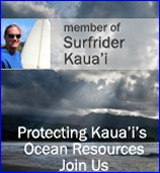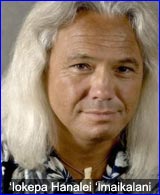Phony Return Voyage of 'Iokepa Hanalei 'Imaikalani
'Iokepa Hanalei 'Imaikalani claims to be a Native Hawaiian. I guess anyone born in the Hawaiian islands can make such a claim. First people to arrive in these islands are thought to have originated from the Marquesas Islands — a group of volcanic islands in French Polynesia in the southern Pacific Ocean.
For those interested in learning about a REAL and TRUE HERO of the Kanaka Maoli, see Kirstin Downey's award-winning archive on Prince Jonah Kuhio Kalanianaole. Recommend beginning with "The Unlikely Odyssey of Prince Jonah Kuhio" [source]

First Polynesians Likely Came to Hawai'i from Marquesas Islands [RED Marker]
'Iokepa also reports he relinquished "everything I'd worked for all my life" to embrace his aboriginal identity and reawaken his ancestral culture.
His wife, Inette, is a Jewish woman, who tells his story and details she surrendered her privileged writer's life to join 'Iokepa by camping on Hawaiian beaches with little food and no money — to walk the paths of his ancestors.

Inette Joins 'Iokepa to Walk Ancestoral Path [screenshot: ReturnVoyage.com]
Together, the two packed all they owned into three suitcases and began their ancestor-driven Return Voyage across America. Their message: what Native Hawaiians lived for 12,000 years — ritual practices that prevented war — have profound implications for the 21st century.
NOTE: Preventing war is a false claim of 'Iokepa, as I will explain later. King Kamehameha I, The Great One, unified the chain of islands under his control through civil war ending around 1810.
I first read of 'Iokepa's mission when Kaua'i local paper, The Garden Island, published a story of 'Iokepa appearing in district court for refusing to carry automobile insurance for their vehicle. He told the U.S. magistrate he was not bound by U.S. or State of Hawai'i law, as both were illegal occupants in "his" land.
I wrote to 'Iokepa noting I admired and was sympathetic to his mission, yet "walking the paths of his ancestors" also required living pono (just). Recogning the two had given up all their worldy possession to live by handout, graciousness of others, and essentially, free-load on this "sacred" land, how would they cover the medical costs of someone they injured by accident if tragedy befell them?
I was impressed that 'Iokepa responded and listened to my concerns. He consented at that point to live kuleana (responsibly) by obtaining insurance. I thereby supported their quest over the years buying their books, treating them to dinners, donating money and encouraging their work.
'Iokepa states he was a successful businessman: paving freeways and laying waterlines for Seattle and environs. He also notes he had a spiritual epiphany demanding (in the presence of his long-dead grandmothers) he relinquish everything he'd worked for all his life, which Inette claims was considerable, and return to his aboriginal heritage. His mission was to fulfil promises he made when he took on life.
'Iokepa believed he should relinquish his life of obsessively hard work and of profound pleasure. I remember him speaking of excessive drinking, smoking and womanizing, while he lived a life of easy money, travel and expensive toys. He now assumed kuleana (responsibility) for his grievously oppressed and denigrated aboriginal Hawaiian people.

'Iokepa Claims Mission to Help HIS PEOPLE [screenshot: ReturnVoyage.com]
Most native Hawaiians I encountered told me 'Iokepa was "full of shit. "Who is he to claim 'HE' represents us or these islands?" they would ask. Struggling local Hawaiians pointed out he had abandoned his "roots" decades ago to seek monetary fortune on mainland.
Or that he wasn't interested in helping Hawaiians in need on the island, as he didn't offer any of his alleged fortune to those "grievously oppressed" here. And, that 'Iokepa was simply self-promoting and feeding some internal pains of guilt.
I wanted not to hear these words. I hoped I had seen a better side of the pair.

'Iokepa Claims Mission to Save HIS ISLANDS [screenshot: ReturnVoyage.com]
Inette writes her husband is Native Hawaiian. She proclaims, "Iokepa's words are quoted in this post's title. He speaks them with a profound sense of grief — and a barely hidden anger. He struggles with those divergent sentiments. He knows that to speak his mind is to court accusations and dismissal as, 'Another angry Hawaiian.' And yes, there is a great deal to be angry about."
"My Islands have become someone else's playground. Their playground, without any sense of responsibility."
Unfortunately, I have learned their story is as phony as are most of their claims. They are not HIS ISLANDS. These are not HIS PEOPLE. This is my Return From Their Voyage, as our islands and our world needs a savior today. I am not that savior. I hope by reading this ... it might awaken you to the challenge. No one person will accomplish this task. We must work together — as one 'Ohana (family).
Hawaiian Kings Did Not Consider 'Aina Sacred. You Should
Kamehameha I, The Great One, traded land for guns. He used these weapons to prevail in civil war around 1810 — as he "unified the islands." Contemporary Hawaiians claim this land, their 'aina, is sacred. One does not trade sacred land for mere trinkets. Kamehameha wanted power — like most rulers of yesteryear and today.
The tribes of Kaua'i were not defeated in war by Kamehameha. This fact empowers residents of Kaua'i today who remember this history. They were and remain defiant. They cooperated voluntarily with the Great King. They joined as long as his rule was pono and furthered aloha.
Scott Goold is one defiant Kauaiian, and today, assumes the historical identity of Kaluaikoolau, who defied the Provincial Government's demand he leave his wife and suffer a slow, isolated death due his leprosy in the Moloka'i Grave Where One is Buried Alive.
Scott defies Hawaiian authority today due their corruption and continuance of Institutional Colonialism. Scott is 25% islander. Like Moana, the Disney princess, he is from the vast ocean. He identifies with his struggling brothers and sisters. His roots on Kaua'i began at Salt Pond.
The story of salt is the story of life. Scott now tells this story to help save life on this planet. Ku'ulei makes salt at the Salt Pans makai (ocean direction) from the quaint village of Hanapepe. Salt processing is in danger due to nearby development.

Ku'ulei Works to Save Salt Processing Outside Hanapepe, Kaua'i, Hawai'i
You've heard the story a million times previously. A developer wants to increase their footprint into our 'aina and environment. Maverick Helicopter, Smokey Mountain, petitions the County of Kaua'i Planning Commission for after-the-fact permits and permits that will expand operations.
Close proximity of Port Allen Airport to Salt Pond contributes to pollution, noise, and chemical runoff and poisons the pa'akai (salt). If you care about life on this planet, you need to care about salt, and this is Step #1 to protecting life on Earth. [Find Out More and Sign Petition]
Hawaiian Kings and Culture Fell Behind in Science
In 1881, King David Kalakaua of Hawaii went on a world tour, the first of its kind for a sitting monarch. He circumnavigated the globe, stopping in Asia, India, Egypt, Europe, and the United States.
Among other things, he sought to encourage immigration from the Asia-Pacific region, as Hawaii's dwindling population had created a labor shortage on its sugar plantations. The king also wanted to introduce the culture of Hawaii to the world. Importantly, he was curious about modern science and technology. [source]
On 21 July 1886, Honolulu businessman Charles Otto Berger organized a demonstration of electric lights at Iolani Palace. The royal residency and palace grounds were fully illuminated for the king’s birthday on November 16, 1886.
By comparison, my grandfather originated from Copenhagen and the island of Zealand — originally a Viking fishing village established in the 10th century in the vicinity of what is now Gammel Strand.
Electricity came to his home a few years before his birth in 1892. Electric trams service began in 1897. O'ahu works to build a controversial tram today. Hawai'i was first in electricty. The culture has stagnated since.
Two of the greatest challenges to the electrification of Hawaii were getting equipment to the island nation and establishing an appropriate fuel supply. There is a lack of science here.
Machinery for the power plants came from the United States, including a turbine manufactured by Leffel & Co., in Springfield, Ohio, dynamos from the Thomson-Houston Co., in Massachusetts, and piping and valves from Risdon Ironworks, in San Francisco. There is a lack of an industrial and manufacturing base here.
Hydroelectric power seemed a natural choice given Hawaii's terrain and wet climate. The Nu'uanu stream, about 6 kilometers northeast of the palace, fed the first electric light station that powered Honolulu's streetlights. But water flow was uneven. The next station built was coal fired. This is why mainland U.S. uses dams. This evens the flow. Environmental science is lacking here.
The electrification of 'Iolani Palace was not the first demonstration of electric lighting. A sugar mill on Maui owned by sugar magnate Claus Spreckels was first. On September 22, 1881, Spreckels lit the electric lights at Mill No. 1 on his plantation. Yes, plantations were the leaders. They focused on self-interest, not island interest. They have "raped" the 'aina and culture to reap profits. This continues today.
Modern Colonial Imperialism and Cultural Corruption Begins
Spreckels held a near monopoly on the sugarcane industry in Hawai'i, thanks to his close ties to King Kalakaua. Spreckels bought political influence by making personal loans to the king and givng "gifts" to the kingdom.
When he established his first sugar plantation, Spreckels sought water rights for irrigation. The Hawaiian cabinet balked. After the businessman made certain monetary donations to the king, a new cabinet was installed. They promptly approved Spreckels's water rights as well as the construction of a 65-km-long irrigation ditch. This development was the longest in the kingdom at the time.
Mahealani Richardson writes, (HawaiiNewsNow) April 1, 2019, The battle over water rights is once again coming to a head. On Tuesday, lawmakers will hear a bill that would extend temporary permits for seven years to big water users like Alexander and Baldwin, giving them more time to get water leases. [source]
Environmental groups, like the Sierra Club, object and argue it is #TimesUp. Water should go back to streams.
Sierra Club claims the measure allows Alexander & Baldwin to continue diverting millions of gallons of water from East Maui streams and bypass a court ruling prohibiting the company from using temporary permits to divert the water.
Randy Cabral, president of Hawai'i Farm Bureau and owner of a small farm in Kau, says the extension is necessary to give small ranchers and farmers time to obtain long-term permits. They have had sufficient time.
In December 2018, Mahi Pono bought roughly 41,000 acres of former sugar land from Alexander & Baldwin with a goal of putting Central Maui back into diversified agriculture.
Legislation to preserve rights for private users of Hawaii's fresh stream water died yesterday. [source]
Last-minute amendment by state Sen. Kai Kahele, chair of the committee on water and land, took lawmakers by surprise.
"This is a completely different bill that protects farmers, that protects ranchers. It provides transparency and accountability, and it opens and turns a new page and a new chapter on how we manage and protect our public trust resources in the state of Hawaiʻi."
The amendment would have preserved stream diversions for all users — except Alexander & Baldwin. Members of the Water and Land Committee voted 3 to 2 in favor of the amended bill. Sen. Donavan Dela Cruz, chair of the Ways and Means Committee decided to defer the measure.
This corruption must end. Phony protests of self-interested people such as 'Iokepa Hanalei 'Imaikalani must be called out for what they are. They hurt progress of the Hawaiian people. Phony Protestors who block the Thirty Meter Telescope (TMT) project do as well.
Kamehameha I launched Civil War in these islands 1782-1810. He turned heavy weapons and cannons on peaceful Polynesian tribes and villages. In his day, he was a "war lord." While the Founders of the USA were throwing off the yoke of a corrupt king, Kamehameha I made himself a king using violence and threw opponents off cliffs.

No Gold Discovered in Hawaiian Islands. Kanaka Kings and Queens SOLD their lands for golden treasures,
lavish foreign trips and private schools for their children.
Many cities in America now have changed Columbus Day to Indigenous Peoples Day, due to the atrocities committed by Columbus and his men. Kamehameha I committed murder as well. The Kanaka revere his memory, because Kamehameha I created a kingdom for them. Yet like Columbus, their actions were not pono.







